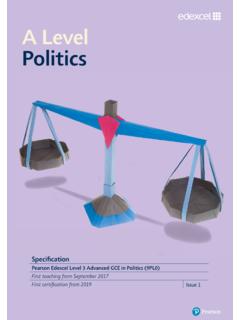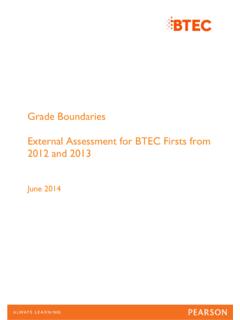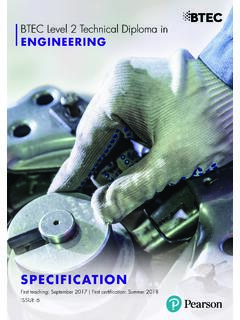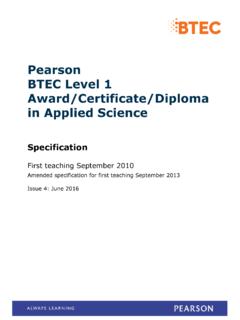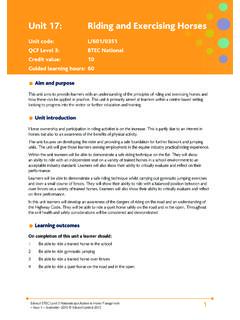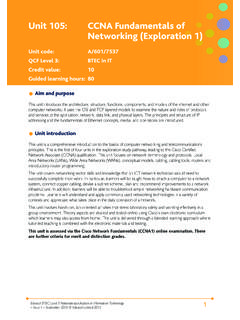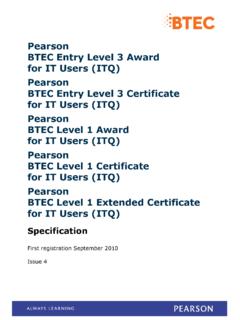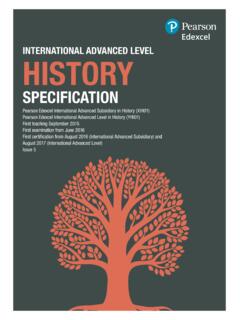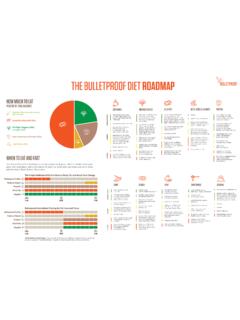Transcription of Unit 43: Promoting Nutrition and Hydration in Care Settings
1 978 1 446 95317 4 Pearson BTEC Level 3 Diploma in Adult Care (England) Unit Issue 1 January 2018 Pearson Education Limited 2018 1 Unit 43: Promoting Nutrition and Hydration in Care Settings Unit reference number: F/616/7360 Level: 3 Unit type: Optional Credit value: 4 Guided learning hours: 32 Unit summary What individuals eat and drink is vital to their health and wellbeing. For our bodies to function properly, it is important that we have a diet that includes all the nutrients required in the right balance. It is also essential that individuals consume an appropriate volume of fluids each day. Failure to maintain a well-balanced diet and keep hydrated can lead to ill health. Where individuals are receiving any type of care or support, it is important that an assessment is made about their Nutrition and Hydration . This should include recording any allergies, likes and dislikes, any specific support they need to eat and drink, and whether they can eat normally or need soft food .
2 In this unit, you will develop knowledge and skills in Promoting health and wellbeing through Nutrition and Hydration , and by following a plan of care in care Settings . You will learn about the principles of Nutrition and a balanced diet, including Hydration , and then apply this in a workplace situation. You will have opportunities to develop, practise and demonstrate the skills required when following a plan of care, and when supporting health and wellbeing through the Nutrition and Hydration of individuals. You will consider special dietary requirements and special diets, including their relevance and importance in care Settings . 978 1 446 95317 4 Pearson BTEC Level 3 Diploma in Adult Care (England) Unit Issue 1 January 2018 Pearson Education Limited 2018 2 Learning outcomes and assessment criteria To pass this unit, the learner needs to demonstrate that they can meet all the learning outcomes for the unit. The assessment criteria outline the requirements the learner is expected to meet to achieve the unit.
3 Learning outcomes Assessment criteria 1 Understand what makes up a balanced diet Define the main food groups Explain sources and role of essential nutrients for health Evaluate the benefits of a balanced diet on health and wellbeing Evaluate the impact of poor diet on health and wellbeing Explain what adaptations to a balanced diet may be required for different groups 2 Understand nutritional guidelines Summarise current national nutritional guidelines for a balanced diet Explain how to access additional support and information relating to Nutrition and Hydration 3 Be able to promote Nutrition in care Settings Explain the importance of a balanced diet Demonstrate how to plan and promote an appropriate balanced diet with an individual that meets their dietary needs Evaluate the effectiveness of different ways of Promoting healthy eating 4 Be able to promote Hydration in care Settings Explain the importance of Hydration Describe signs of dehydration Explain ways to support and promote Hydration with individuals Demonstrate how to promote Hydration with an individual that meets their needs Evaluate the effectiveness of different ways of supporting and Promoting Hydration 978 1 446 95317 4 Pearson BTEC Level 3 Diploma in Adult Care (England)
4 Unit Issue 1 January 2018 Pearson Education Limited 2018 3 Learning outcomes Assessment criteria 5 Understand how to prevent malnutrition in care Settings Explain the factors that may affect nutritional intake Explain the risk factors that may lead to malnutrition Describe the signs of malnutrition Explain ways of ensuring foods and drinks have increased nutritional density through fortification Discuss the appropriate use of nutritional supplements 6 Be able to carry out nutritional screening in care Settings Explain the purpose of nutritional screening Carry out nutritional screening in line with agreed ways of working Implement the actions identified by nutritional screening in line with agreed ways of working Monitor, record and review the actions taken following nutritional screening in line with agreed ways of working 7 Be able to monitor and record Nutrition and Hydration needs with individuals in care Settings Describe the roles and responsibilities of self and others in assessing and managing the nutritional and Hydration needs with individuals Explain ways in which Nutrition and Hydration can be monitored Monitor.
5 Record and review Nutrition and Hydration of an individual in accordance with their care plan 8 Understand factors that affect special dietary requirements in care Settings Explain factors that may promote healthy eating in different groups Explain factors that may create barriers to healthy eating for different groups Explain why individuals may have special dietary requirements Explain why it is important for individuals with special dietary requirements to follow special diets 978 1 446 95317 4 Pearson BTEC Level 3 Diploma in Adult Care (England) Unit Issue 1 January 2018 Pearson Education Limited 2018 4 Content What needs to be learned Learning outcome 1: Understand what makes up a balanced diet The main food groups and their sources Carbohydrates: o starches, potatoes, pasta o natural and refined sugars o dietary fibre, bran. Proteins: o plant, tofu, pulses o animal, meat, fish. Fats: o saturated, full-fat milk, polyunsaturated, monounsaturated.
6 Minerals: o calcium, milk, soya o iron, red meat, egg yolk, green vegetables o sodium, cheese, meat o potassium, apricots, bananas. Vitamins: o A, carrots, fish, liver oils o B complex, cereals, meat, eggs o C, oranges, blackcurrants o D, fish oils, tuna o E, sunflower seeds, peanut butter o K, kale, spinach. Water. The role of essential nutrients Tissue growth and repair. Immunity against infection. Production of energy. Muscle strength. Principles of a balanced diet Healthy diet, based on sound nutritional principles. high consumption of fruits and vegetables, unprocessed foods. Low consumption of red meat and fatty foods, salt, pepper, sugar, saturated fats, coffee and other caffeinated beverages, alcohol. Raw foods and whole grains preferable to processed or refined foods. Protein primarily from fish, dairy products, nuts. Plenty of water. 978 1 446 95317 4 Pearson BTEC Level 3 Diploma in Adult Care (England) Unit Issue 1 January 2018 Pearson Education Limited 2018 5 What needs to be learned Benefits Life expectancy.
7 Physical and mental wellbeing. Disease prevention, cardiovascular, cancer. Impact of poor diet on health and wellbeing Effects on general physical health and weight. Effects on wellbeing. Potential impacts, reduced physical and mental performance, fatigue, obesity, increased risk of diseases such as cardiovascular disease and cancers, decreased immunity, deficiency diseases such as anaemia, rickets, osteoporosis, tooth decay. Adapting balanced diets for different groups Groups, older people in good health, different genders, different cultures, people with health problems, people with dementia, people with disabilities, people with learning disabilities, people with specific dietary preferences, vegetarians, vegans. Adaptions: o according to needs and preferences, personal taste, ability/inability to eat without support o specific needs o substituting foods. Reducing/increasing certain foods. Learning outcome 2: Understand nutritional guidelines Current national guidelines for a balanced diet National guidelines, government dietary recommendations, the Eatwell Guide ( food Standards Agency), Eight Tips for Healthy Eating (NHS).
8 Accessing additional support and information Additional support, food Standards Agency, National Institute for Health and Clinical Excellence (NICE), the Department of Health, Public Health England, British Nutrition Foundation. 978 1 446 95317 4 Pearson BTEC Level 3 Diploma in Adult Care (England) Unit Issue 1 January 2018 Pearson Education Limited 2018 6 What needs to be learned Learning outcome 3: Be able to promote Nutrition in care Settings Individual Someone requiring care or support; it will usually mean the person or people supported by the learner. Importance of a balanced diet Definition of balanced diet. Impact on wellbeing, weight, sleep, general health, mental health. Planning a balanced diet Factors to consider, likes, dislikes, allergies, cultural and religious requirements, specific health needs. Planning, one week (breakfast, lunch, evening meal, snacks, liquids). Ensuring balance and variety of diet. Promoting a balanced diet Promotion, through planning of care, explanation as appropriate, encouragement, presentation of food , good palatability, variety, providing suitable utensils, trying different approaches.
9 Learning outcome 4: Be able to promote Hydration in care Settings Importance of Hydration Role of water in the body, dilution and removing toxins, kidney function. Water loss, excretion, sweating. Water gain, eating, drinking. Water balance. Signs of dehydration moderate Dry mouth, lips and eyes, headache, tiredness, dizziness, decreased urine output, muscle weakness. Signs of dehydration severe Extreme thirst, loss of skin elasticity, oliguria, sunken eyes, absence of perspiration, rapid heartbeat, low blood pressure. Supporting and Promoting Hydration Explaining the benefits of Hydration . Discovering individual s likes and dislikes. Provision of fluids at regular intervals. Water naturally occurring in foods, in soup, in yoghurt. Encouragement. 978 1 446 95317 4 Pearson BTEC Level 3 Diploma in Adult Care (England) Unit Issue 1 January 2018 Pearson Education Limited 2018 7 What needs to be learned Learning outcome 5: Understand how to prevent malnutrition in care Settings Factors affecting nutritional intake Individual preferences and habits.
10 Physical factors, location of meal, positioning, oral hygiene. Psychological factors, depression, stress, eating disorders, food phobias. Income, lifestyle and social convention. Culture and religion. Advertising and fads. Family and peer group influences. Ethics, morals and political beliefs. Risk factors for malnutrition Risk factors, age, medical conditions, effects of medication, psychological factors, income, oral hygiene, individual habits, cognitive disorders. Signs of malnutrition Weight loss or gain, decreased muscle and tissue mass, decreased mobility and stamina, dry and scaly skin, breathing difficulties, increased risk of chest infection and respiratory failure, wounds take longer to heal, slower immune response, difficulty staying warm. Fortification Increasing energy and nutrient content. Addition of, milk powder, evaporated milk, cheese, butter, cream, sugar, syrup, dried fruits, figs, prunes, potatoes, branded food fortifications.
